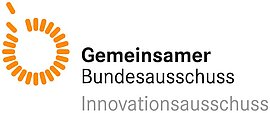Dr. Till Dresbach (Universitätsklinikum Bonn)
Prof. Dr. Andreas Müller (Universitätsklinikum Bonn)
Prof. Dr. Ludwig Kuntz (Management im Gesundheitswesen, Universität zu Köln)
Prof. Dr. Martin Hellmich (Institut für Medizinische Statistik und Bioinformatik [IMSB], Universität zu Köln)
Prof. Dr. Indra Spiecker gen. Döhmann, LL.M. (Goethe-Universität, Frankfurt am Main)
Dipl. Gesundheitswirtin Stefanie Wobbe-Ribinski (DAK-Gesundheit)
Dr. Dirk Horenkamp-Sonntag (Techniker Krankenkasse)

Federal Joint Committee
Innovations Board
Every year, nearly 10,500 very small “premature babies” with a birth weight of less than 1,500 grams are born in Germany. In order to give them a good start into life, they are usually provided with intensive care over a long period of time in so called perinatal centers.
The use of webcams in perinatal centers is intended to enable parents to maintain contact with their child over the distance. This is expected to have social as well as medical effects. An increased sense of closeness to the child is intended to strengthen the parent-child relationship and promote lactation and thus the nutrition of newborns with mother’s milk. In addition to the positive effects of webcams, we must however also consider possible negative effects, such as heightened fears of parents triggered by the observation of critical situations as well as the difficulty of assessing the child’s condition from a distance.
For the first time, the project Neo-CamCare evaluates the use of webcams for the location-independent, virtual real-time image transfer of premature babies to their parents.
Within the project, we aim to clarify legal framework conditions such as data protection, query the needs, experiences of parents as well as their demands, possible implementation barriers and the extra work on the part of the medical staff. In addition, an action guideline for parents, caregivers and physicians will be developed and evaluated.
The aim of the subproject Ethics is to develop an action guideline that supports parents in weighing up individual advantages and disadvantages of using a webcam. During the period of use, the action aid aims to serve as an emotional support for the parents and to increase the satisfaction with the use of webcams. In addition, physicians and nurses will receive support for (hospital) everyday life through the action guideline, as it also aims to address possible difficulties with regard to implementation and use of webcams on the part of physicians and nurses. The action guideline includes accompanying educational and information material, provides support and counselling services and serves as a template for how to deal with possible questions from parents during streaming times.
The development of the action guideline is based on empirical investigations. The analyses are based on an observational study in a perinatal center, group discussions with parents of premature infants with regard to their experiences on the parent-child relationship during the first time of life in the intensive care unit, as well as individual interviews with parents, nurses and physicians about their experiences in dealing with webcams in this context.
Johanne Stümpel M. Sc.
+49 (0)228 - 73 66 234
johanne.stuempel[at]uni-bonn.de
ceres – Cologne Center for Ethics, Rights, Economics, and Social Sciences of Health
Universitätsstr. 91
50931 Köln